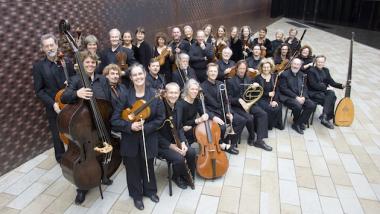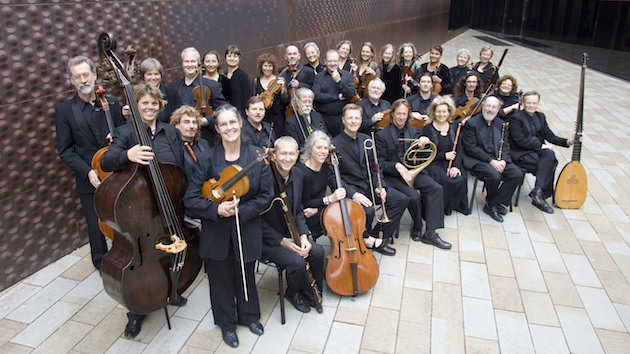
The Judas Passion is part of Philharmonia Baroque’s new initiative that brings Baroque music into the 21st century — or is that vice versa? Launched this month, New Music for Old Instruments pairs today’s composers with yesterday’s instruments, both refreshing the repertoire for historically informed performers and audiences, and providing contemporary composers with a rich new/old palette of instrumental colors.
“We’re very interested in new as well as old music,” says PBO’s Nicholas McGegan. “A period instrument orchestra is not something which should be wearing wigs and silk ruffles and being prissy prissy. We’re out there in the music scene as live performers in the 21st century. I hope to show composers and audiences that what period instruments can provide is a positive thing.”
Augmenting a Tradition
Adding a dash of new music is appropriate and even necessary for an American West Coast operation, McGegan says, that lacks — for better and worse — the vast traditional repertoire legacy of European HIP orchestras or even Boston’s venerable Handel & Haydn Society. “We don’t have 150 years of heritage to live up to, we can’t wrap ourselves in the flag like [French Baroque orchestra] Les Arts Florissants. The only way to develop a repertoire that large is to create it. We can be the bad boys on the block!”
PBO is looking for composers sympathetic to its sound, and willing to work with the musicians to learn the ins and outs of unfamiliar instruments. “We need that personal way of doing it where the composers will be there to talk to the musicians, rather than a mail order commission from a big name,” McGegan says. “This initiative is about having composers write something for us and working with us to produce the piece. If we just sort of asked somebody we didn’t know, it’s not the same. We want people who are interested in the sounds and ethos of the 18th century and who will take it and make it their own language, in much the way composers of the past did” with music from before their time.
He thinks many composers will cherish the special sonorities of Baroque instruments as opposed to those who admit only the “one-sound-fits-all aesthetic I grew up with that would use the same style with Bach and Tchaikovsky. Period instruments are not primitive versions of modern instruments. There are things that period instruments can do that modern ones can’t — flutes can glissando, the different sounds of gambas and others that have fallen out of the modern orchestra — those sounds not generally found in today’s orchestras are exciting for a composer to experiment with.”
He enjoys the opportunity to work with composers, to show them the instruments’ limitations and potential — a rare opportunity for him and PBO musicians. “I usually just work with the European dead,” he cracks.
So far, he’s signed up acclaimed composers like Matthew Aucoin, Jake Heggie, and Pulitzer Prize-winner Caroline Shaw, who will appear with Beamish in PBO’s October 10 Sessions concert to inaugurate the series with a presentation of their own new music for old instruments and that of female composers from the Baroque era.
Embracing Risk
There’s some risk involved in challenging audiences for what is a relatively narrow niche — historically informed performance — with music that ranges beyond the usual 16th-18th-century comfort zone. But McGegan contends that, unlike a few decades ago when even playing a composer as relatively “late” as Mozart in a PBO show might produce grumbles and even wails from purists, “today’s audience is much more sophisticated and curious. Our audience really does have inquiring minds — and also a good knowledge of what we’ve done in the past. They will hear a new piece with that background, coming to it with a good basis to take it in.” And really, as immortal as they are, how many times can Bach, Handel, Vivaldi, Telemann and more obscure names operating in a relatively narrow stylistic range continue to lure even hardcore fans back?
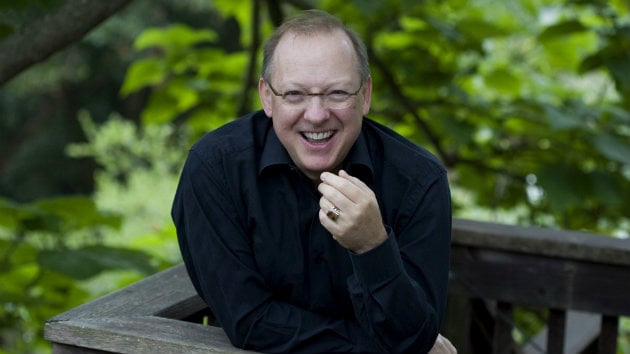
“Of course, we’ll have people who will complain,” McGegan admits, “but running the Philharmonia is like running a restaurant: There are going to be things people will not like. Therefore, you have to have a varied menu. There’s always going to be somebody who says, ‘I don’t like that,’ and that’s fine, give them something else. If you only played the safest stuff you’d be a music [fill in name of bland chain restaurant whose lawyers McGegan would rather not annoy]. I would hope that for the five audience members who’ll hate it, maybe we’ll get 50 who’ll love it and wouldn’t have come otherwise.”
Besides keeping the instruments constant, McGegan aims to entice his core audience to new music by programming old and new works side by side and showing connections between them. This month’s Judas Passion concerts also have a short Telemann work that also features flute, underlining the flute’s historically darker role, going back to ancient Greece and Rome, rather than the emotions than we typically associate with it today.
So far, audience response has been positive for PBO’s previous new music efforts, beginning with their 2006 performance of Jake Heggie’s To Hell and Back with Broadway star Patti Lupone. “Some people told us later that they came with the expectation they would not like it,” McGegan recalls, “and what they got was an exciting 50-minute drama and they were really moved by it. It does challenge and thrill those of us who want to rise to that challenge — and the other lot can go to [bland chain restaurant].”
A Passion From the Other Side
A few years ago, composer Sally Beamish was enjoying a glass of wine at the Glasgow home of her old friend and neighbor, Nicholas McGegan. The conversation turned to Baroque music, including J.S. Bach’s glorious Passions. “Wouldn’t it be fun,” McGegan mused, “to write a 21st-century passion — but for period instruments?” Beamish took another sip.
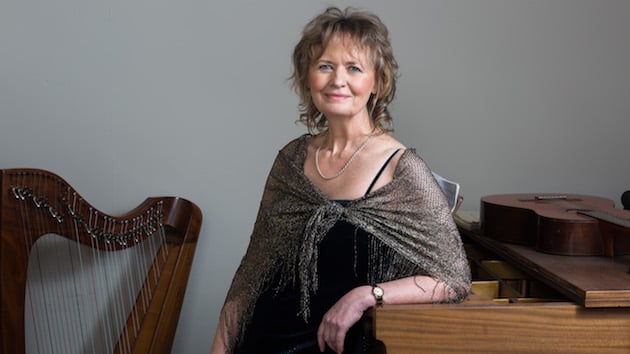
The idea stuck. The Scotland-based composer, also a violist, went on to write music (Spinal Chords) for the Orchestra of the Age of Enlightenment, PBO’s London sister orchestra, which McGegan also conducts. And when the opportunity arose for a joint commission involving both orchestras, she remembered that partly wine-inspired notion — and the silken sound of those period instrument strings.
She also recalled the biblical story of Peter, who, according to the New Testament, thrice denied he knew Jesus, and yet repented, was forgiven and became the rock the Christian church was founded on. Contrast his fate to that of Judas, who betrayed Jesus to the Roman authorities — an essential part of Jesus’s sacrifice — and also expressed remorse, yet remains reviled. “Why does Judas not get to be forgiven?” she wondered, invoking her own Quaker beliefs.
Beamish remembered that another New Testament figure who doesn’t appear in Bach’s passions expressed similar sentiments. “Mary Magdalene says ‘if he can’t be forgiven, who can? What’s the point of forgiveness?’ She becomes a questioner, a voice of indignation.”
The question of forgiveness animates Beamish’s The Judas Passion, which PBO performs four times October 4-8 at Stanford and in Berkeley and San Francisco. McGegan leads this U.S. premiere, as he did the world premiere with OAE last month.
Ancient Myth, Modern Morality
Though Beamish’s piece, based on a libretto by David Harsent, uses ancient forms and instruments, it takes a decidedly modern approach to questions of sin and forgiveness.
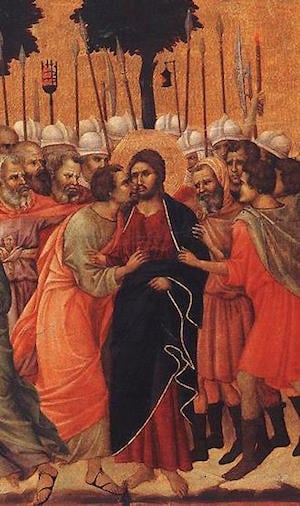
“Whereas the 18th-century passions portray Judas as the bad guy, here in the 21st century, we think, maybe not,” McGegan explains. “Maybe he’s fulfilling a role destined for him. Was he actually bad, or did he have other defensible ideas?”
In contrast to the severe black-and-white depictions of the old Lutheran sacred works, The Judas Passion takes a more contemporaneously complex view that’s probably a lot more pertinent in a polarized time in which so many of us fail to comprehend the seemingly radically opposed notions of our own countrymen and women.
“It’s about understanding that somebody might come from a different set of beliefs, and listening to them and accepting that,” Beamish explains. “This piece is all about listening to Judas and where he might be coming from. What could have motivated him to do what he did? Looking at these characters in depth, they become very complex. We wonder what their motivations were, what choices they made and why. Once you understand the story of the person who has committed the atrocity, you are a step closer to forgiving them.”
McGegan says, “It’s a piece to make you think, taking a familiar story from an unfamiliar angle.”
The Flavor of Bach
That’s a good description of the music as well — familiar instruments, unfamiliar approaches. Beamish uses the form J.S. Bach made famous in his surviving Passions according to St. John and St. Matthew, including arias, chorales and so on rather than 19th century leitmotivs or the continuously flowing styles that emerged in the 20th century. Her hour-long composition even incorporates elements from the latter, such as a few notes she made the basis for a section of her Judas Passion — though of course rendered in her own 21st century musical language. “Every now and again, you get the flavor of Bach,” she says. But “it’s not a pastiche!” McGegan insists repeatedly. The Judas Passion is a modern music drama that just happens to use ancient instruments.
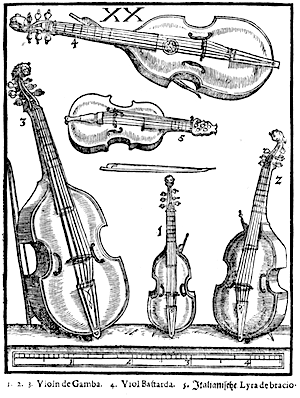
It was those instruments that drew Beamish to OAE/PBO. “I didn’t want to use modern instruments,” she explains. “I wanted it to be a bit more unexpected, more fragile, more delicate, because of the sound of the Baroque instruments. Particularly with the strings (which eschew Romantic-style vibrato except to produce special effects), “you get this amazing, glossy, fragile sounds, very different from modern instruments.” Baroque flutes and brass, too, produce dramatically different sonorities from their modern counterparts — and pose different challenges for the players, such as having to switch instruments to produce notes outside each instrument’s limited range of keys and pitches.
Writing for period instruments forced Beamish to learn from historically informed musicians. “It’s difficult enough writing a piece over an hour long without having to learn the instruments, too!” she laughs. “I had to ask all the time, ‘Is this going to work? Is this possible?’”
But those differences, including Baroque tunings, also afford new possibilities for contemporary composers, like pairing two trumpets pitched a half step apart that produce “some harmonics out of tune to our ears,” Beamish explains. “It gives an astringency I’ve worked into the piece.”
She chose an archlute to get “these wonderful, delicate bass notes,” and allowed the performer the kind of limited improvisation she would have expected during that archaic stringed instrument’s heyday.
But “the most exciting thing” has been a sound much more prominent in contemporary music than Baroque. “Percussion is very much a feature,” she says, but not modern drums or vibes. Rather, Beamish’s Passion evokes the sound of its Middle Eastern setting via North African instruments like the riq tambourine. Only a single percussionist appears, but in the crucial garden scene, the string players conjure “the sound of the night with little percussion instruments that sound like crickets.”
With help from an Austrian instrument maker, Beamish spent months devising her own percussion instrument — a kind of chime contrived from steel disks resonating against tubular bells — to summon the sound she imagined for the climactic episode in which Judas betrays Jesus for thirty pieces of silver. “I’m being a sound designer with this percussion,” she chuckles.
Surmounting the challenges of old/new instrumentation, tunings, and the rest “has made me feel braver about writing for instruments I don’t understand,” Beamish says, including those from other cultures. “I’m feeling more inclined to approach musicians and show them what’s possible on instruments. And to start imagining sounds that haven’t been heard before — sort of broadening my horizons musically. It’s hard to believe it all started over a glass of wine in a Glasgow tenement!”
Philharmonia Baroque presents The Judas Passion
Wednesday October 4 2017, 7:30 p.m. | Bing Concert Hall, Stanford
Friday October 6, 2017, 8 p.m. | Herbst Theatre, San Francisco
Saturday October 7, 2017, 8 p.m. | First Congregational Church, Berkeley
Sunday October 8, 2017, 4 p.m. | First Congregational Church, Berkeley
PBO Sessions
New Music For Old Instruments
Female Composers and the Women Who Bring Their Music to Life
October 10, 2017, 8 p.m.
Nourse Theatre | 275 Hayes Street, San Francisco
Correction: The first edition of this story misspelled Caroline Shaw's name. We regret the error.

